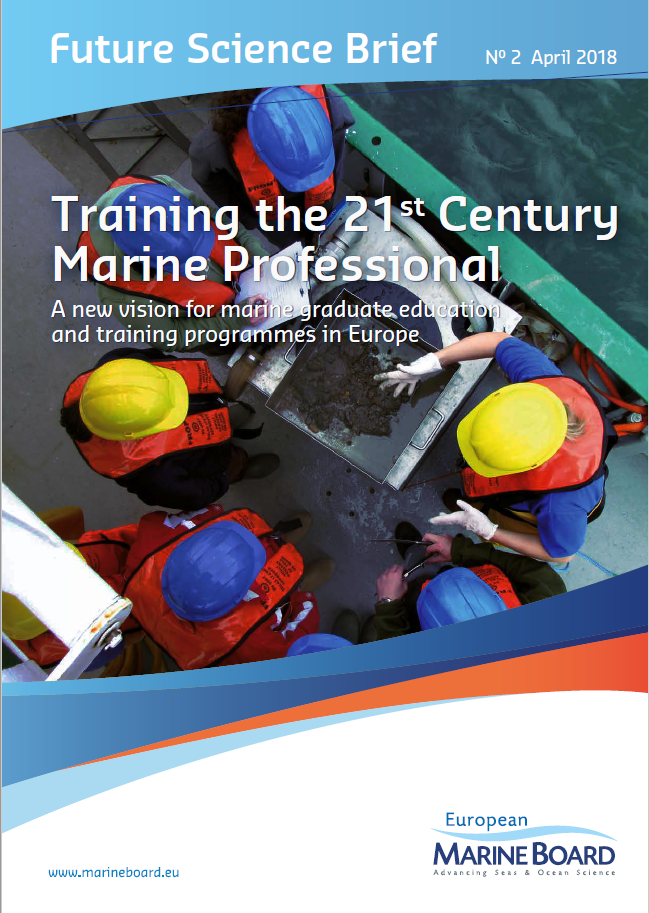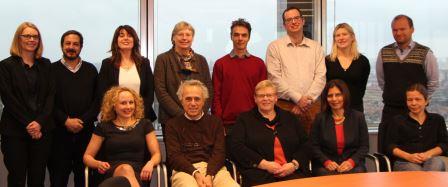Outputs
 Future Science Brief 2, Training the 21st Century Marine Professional: A new vision for marine graduate education and training programmes in Europe (April 2018)
Future Science Brief 2, Training the 21st Century Marine Professional: A new vision for marine graduate education and training programmes in Europe (April 2018)
News Release and news article on the publication (April 2018)
News article on the launch event (September 2018)
Launch event for the publication (September 2018)
Fact Sheet on the marine graduate training publication (August 2018)
Impact Report on the marine graduate training publication (November 2020)
Sea Tech Week Workshop on The future of observations from seabed to space: Training to support marine science (October 2020)
Background
 The workforce for tomorrow’s marine and maritime industry, policy and research fields will be drawn from a pool of graduates who are currently receiving training in higher education institutions. Currently, dedicated marine science programmes account for less than 10% of higher educational (degree) programmes in Europe, although training relevant to marine scientific fields or applications is also included in broader disciplinary training programmes, e.g. environmental courses.
The workforce for tomorrow’s marine and maritime industry, policy and research fields will be drawn from a pool of graduates who are currently receiving training in higher education institutions. Currently, dedicated marine science programmes account for less than 10% of higher educational (degree) programmes in Europe, although training relevant to marine scientific fields or applications is also included in broader disciplinary training programmes, e.g. environmental courses.
In order to facilitate the anticipated growth and job expansion envisioned by the EU Blue Growth initiative, a skilled workforce will be required, comprised of graduates from many different levels of the educational system. Education and research are, therefore, central components of the blue growth strategy and it is recognized that training itself, and the delivery of high-quality graduate programmes, is part of the engine which drives innovation and technology development in maritime sectors.
Objectives
- Conduct a high-level analysis (e.g. SWOT) of the current marine science education landscape in Europe
- Identify the main barriers to better collaboration at national, regional and pan-European level to avoid fragmentation and duplication of effort
- Contribute to identifying the right balance of bottom-up initiatives by scientists and educators, and top-down initiatives at several hierarchical levels including the EU, member states and universities
- Consider innovative training instruments to identify and accommodate the needs of society, policy, industry and young scientists themselves
- Develop a vision for the future of European marine science education and training
- Make high-level proposals towards improving the educational landscape of marine sciences in Europe and creating a coherent framework for the training of 21st century marine experts
Related activities
- Young Talent and the Blue Economy, 25 September 2018, Brussels, Belgium. More information is available here.
- 5th Atlantic Stakeholder Platform Conference "Blue Economy in the Atlantic Area: Fostering Sustainable Jobs, Competitive Skills and Career", 23-24 October 2018, Vigo, Spain
- Workshop 'How innovative training can support Blue Growth' organized by the European Marine Board in collaboration with EuroMarine and JPI-Oceans at European Maritime Day 2016 (28 May 2016, 9:00-10:30). More information is available here.
Meetings
- 14-15 January 2015, Brussels, Belgium
- 15-16 September 2014, Ghent, Belgium
Members
Chair: Magda Vincx, Marine Biology Section, University Ghent, Belgium
Co-Chair: Tim Deprez, Marine Biology Section, University Ghent, Belgium
Working Group members:
Øyvind Fiksen, University of Bergen, Norway
Guillaume Roullet, Université de Bretagne Occidentale (- IUEM), France
Avan Antia, University of Kiel, Germany
Marja Koski, Technical University of Denmark (DTU), Denmark
Pauhla McGrane, Galway-Mayo Institute of Technology, Ireland
Bev Mackenzie, Institute of Marine Engineering, Science & Technology (IMarEST), UK
Luís Menezes Pinheiro, University of Aveiro, Portugal
Maurizio Ribera d'Alcalà, Stazione Zoologica Anton Dohrn, Italy
Jeanine Olsen, University of Groningen, Netherlands
Additional contributions from:
Conor O’Carroll, Ireland
Contact at European Marine Board Secretariat: Paula Kellett Email